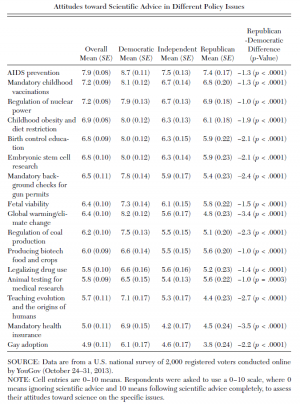Republicans trust science—except when it comes to health insurance and gay adoption

A new study finds that while Democrats are generally more "pro-science" than other political groups, Republicans are also inclined to defer to science across a range of policy issues. In fact, there are only four issues where Republicans exhibit less trust than independents: global warming, evolution, gay adoption, and mandatory health insurance. This new study is part of the March 2015 issue of The ANNALS of the American Academy of Political and Social Science.
"Republicans are not especially different from independents (and other non-Democrats) in their willingness to defer to science," wrote the study's authors. "Indeed, controlling for ideology and demographic factors, Republican identification is associated with an increase in the deference to science for fourteen of sixteen issues: all but mandatory health insurance and gay adoption. And even here the effect is not statistically significant."
Researchers Joshua M. Blank and Daron Shaw examined a 2013 survey of 2,000 registered voters in the U.S. The researchers examined respondents' deference to science on a scale of 0-10 when it came to 14 policy issues, including child vaccinations, stem cell research, global warming, child obesity and diet, AIDS prevention, birth control education, legalizing drug use, gun control, regulation of nuclear power, animal testing, and teaching evolution in schools.
They found that for only four issues did Republicans give less than a midpoint score of 5: global warming (4.8), evolution (4.4), gay adoption (3.9), and mandatory health insurance (3.5).
Other findings include the following:
- The average score on the "deference-to-science" measure for all respondents on all issues was 6.4.
- Of the topics studied, the six issues where people of all political affiliations are most likely to defer to science were mandatory vaccines, AIDS prevention, nuclear, power, childhood obesity, birth control, and stem cell research.
- The issues that received the lowest deference scores were biotech foods, legalizing drug use, animal testing, evolution, mandatory health insurance, and gay adoption.
- The average deference score across all issues was 7.5 for Democrats, 5.6 for Republicans, and 5.8 for independents.
The study's authors continued, "Our results suggest that scientific recommendations on public policy are taken seriously by partisans of all stripes. Thus, what science has to say about an issue appears to be a reasonable starting point for lawmakers or bureaucrats seeking to forge consensus on a given issue; in a time of extreme polarization, there is some reason to believe that science can offer common ground."
More information: This article is part of the March issue of The Annals, entitled "The Politics of Science: Political Values and the Production, Communication, and Reception of Scientific Knowledge," edited by Elizabeth Suhay and James N. Druckman.
Provided by SAGE Publications
















